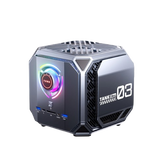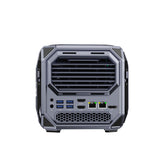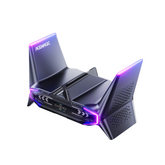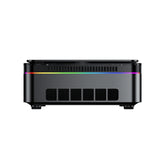Intel vs AMD Ryzen Mini PC: The Best and Real Comparison
In the budget and mid-range market segments, Intel and AMD are competing hard. While Intel’s new Raptor Lake processors have wrested the gaming crown from AMD, the latter’s current-gen Ryzen models still offer impressive integrated graphics performance.
They can run casual games and productivity software without the need for a dedicated video card. But how do these processors compare?
Key Notable Features
Price
The price of an Intel processor, Ryzen 9 7950x3d, is an important factor to consider when choosing a CPU for your PC build. Intel processors have historically been more expensive, but fierce competition between AMD and Intel has driven prices down considerably. The cost of an Intel or AMD CPU should be weighed against your budget, intended use, and compatibility with other components before you make a purchase.
Intel’s latest desktop processors are generally more expensive than AMD’s current generation of chips, though the gap has narrowed recently. The Core i9-13900K, for example, runs about $100 more than the Ryzen 9 7950X3D. However, Intel’s improved performance in lightly threaded apps may make it a better choice for productivity-focused systems.
When it comes to gaming, Intel’s Raptor Lake chips have wrested the crown from AMD’s standard models. However, the new 5nm X3D models feature AMD’s second-generation 3D V-Cache technology, which imparts significant improvements in gaming performance.
The new chips also have a smaller L3 cache, which improves memory latency and increases overall performance. The only drawback is that the X3D models require a more expensive motherboard.

However, the AM5 platform will be supported for five years, which makes it a good long-term investment. It’s worth noting that these models tend to run hotter than their Intel counterparts, so a high-powered cooling system will be required.
Performance
If you're looking for a desktop processor that can handle demanding PC gaming, Intel is still the best option. However, AMD's latest CPUs have a lot to offer for those who want the performance of a premium desktop but need to stick to a budget.
Both AMD and Intel processors have great options for gamers, content creators, and business professionals. However, each brand offers different advantages that might make it a better choice for your specific use cases.
For example, an Intel processor can perform faster in multi-threaded tasks but may not be as efficient at encoding a long video. On the other hand, AMD's new processors are excellent at balancing performance and efficiency.
While the Intel Core i9 13900K remains the fastest desktop processor on the market, AMD's Ryzen chips have reached parity with it in some 1080p gaming benchmarks. They also provide better graphics and more processing cores than Intel's last-generation flagship processor.
Integrated Graphics
For decades, Intel and AMD have battled to offer the fastest and most capable processors for casual users, gamers, and professional PC setups. While Intel held a firm grip on flagship performance between 2005 and 2015, AMD made a comeback in 2017 with its revolutionary Ryzen chips.
When it comes to evaluating CPU performance, comparing specs alone doesn’t tell the whole story. To really judge a chip, you need to evaluate its overall performance in the tasks and games that are important to your planned use case.
Gaming is one area where the AMD Ryzen processors excel, with the latest models featuring 12 cores and 24 threads to outpace the Intel Core i9-9900K in our Cinebench R15 test. In addition, the Ryzen chips are also faster at multi-core workloads, such as encoding a 4K video with Handbrake.
While Intel’s latest Raptor Lake chips have wrested the gaming crown from AMD’s top-of-the-line Ryzen 7000 models, they still lag behind when it comes to peak GPU performance. This is mainly due to Intel's chips' higher power consumption, which requires aggressive (and thus expensive) cooling to achieve their maximum potential.
Nonetheless, the Ryzen chips are a great choice for gamers on a budget, thanks to their competitive pricing and stellar integrated graphics performance. However, it’s worth noting that Intel’s newer Cezanne APUs have even better graphics performance for a fraction of the cost.

Heat Generation
Intel has dominated the desktop processor market for decades, but AMD has taken things to the next level with its innovative Ryzen chips. The new line of AMD gaming processors is able to compete with high-end Intel products in terms of performance and can handle popular games without the need for an additional video card or GPU.
However, the latest AMD processors still don’t match Intel in the arena of frame rate-oriented gaming and single-threaded applications. They also lack the Intel advantage when it comes to multi-core workflows, as shown in a POV-Ray benchmark and a quick test of encoding a 12-minute 4K video using Handbrake.
Fortunately, the latest Intel Core i9 processors offer a significant performance boost when they’re overclocked. This can significantly increase their ability to handle demanding workloads, resulting in a more enjoyable computing experience for gamers and content creators alike.
Intel’s 13th-generation processors also offer better productivity performance than the previous generation, making them a solid pick for budget builders. These models also support a wider range of RAM, providing a more futureproof option for users who plan to upgrade their PCs in the coming years.
The Intel Core i9 is also the best choice for hardcore gamers who need a powerful desktop processor that can keep up with demanding games and graphics rendering.
Intel or AMD Ryzen: Which One is Better For Gaming?
Gaming PCs are the most popular way to get into computers, but with so many options, it’s hard to know which is best. Here, we break down the differences between AMD and Intel processors to help you decide which is best for you.
The most important factor for PC gamers is how well the system runs games. Both AMD and Intel offer systems with fast graphics cards and high-end processors. Intel has a slight edge in terms of overall game performance, but this can vary from game to game.
For most users, the best gaming CPU is a mid-range Intel or AMD processor. However, you may want to consider a higher-end CPU for those who enjoy playing demanding games on max settings with many in-game settings and resolutions.

If you’re looking for the absolute fastest gaming processor, AMD’s new 5nm Ryzen X3D chips are an excellent choice. These chips feature the company’s second-generation 3D V-Cache technology to impart tremendous gains in-game performance, resulting in a significant lead over Intel’s best desktop CPUs like the 6 GHz Core i9 14900K.
While these chips can’t match Intel’s hulking, 16-core, hyperthreaded HEDT processors in productivity applications, they still provide an outstanding gaming experience for a fraction of the price and power requirements of a standard Intel chip.
Intel and AMD also differ in terms of power-to-performance efficiency. The latest AMD Zen processors consume significantly less power than their Intel counterparts when calculating complex AI in a video game.
This is why they’re able to run more demanding games at lower settings with greater frame rates. Intel’s most recent chips, on the other hand, tend to draw more power than their AMD equivalents when calculating in-game AI, and this is often a noticeable difference.
Another factor to consider is how many cores you’ll need. While the best mainstream Intel processors can handle the needs of most gamers, some users need more cores for other tasks, such as video transcoding or CAD. For these users, Intel’s HEDT CPUs are an excellent option. However, they can be expensive and require more cooling.
Finally, you should also look at integrated graphics performance. While most PC gamers will purchase a separate graphics card, there are some cases where the performance of a processor’s integrated graphics can be crucial.
Many mini PCs and handheld PCs rely on these kinds of chips, as do some older games that can run beautifully on integrated graphics.

Here, AMD’s new 8000-series APUs are a clear winner with their powerful graphics capabilities and affordable pricing. Intel, on the other hand, has not yet released its own entry-level processor with integrated graphics.
Pros and Cons of Intel and AMD Ryzen Mini PCs
A mini computer is a small, powerful computer perfect for use at home or in the office. It is great for running media, productivity apps, and games. While most mini PCs come with Intel processors, AMD is beginning to challenge Intel's dominance in the space.
Whether you're looking for the best Intel or AMD mini PC, there are plenty of options to choose from.
The ACEMAGIC AMR5 is a desktop PC that uses an AMD Ryzen class CPU in a unique enclosure that differs from the standard NUC design.
This enables the unit to be easily placed on a desk or TV unit. While the AMR5 offers excellent performance for its price, there are a few drawbacks to consider before purchasing.
AMD and Intel offer a variety of processors that are suitable for different types of applications. Intel's i7 and i9 series processors are excellent choices for gaming, while AMD's Ryzen 7 and Ryzen 5 chips provide superb performance for their prices.
The biggest difference between the two brands is their approach to integrated graphics. Intel offers an iGPU with every desktop CPU, while AMD has only recently added an iGPU option for its mainstream Ryzen chips.
While the new i7 8000K chips from Intel are undoubtedly excellent gaming choices, they tend to be overpriced for most buyers.
Fortunately, AMD's latest Ryzen 7 7000 "X3D" models leverage the company's breakthrough chip-stacking technology to deliver incredibly fast gaming performance at a much more affordable cost.
On the productivity side of things, Intel's newest core architectures do an excellent job of handling demanding multithreaded workloads. They can also be overclocked for extra performance, and they consume less power than their AMD counterparts.

However, some users may experience laggardly drivers and software support for Intel's products, which can be a pain.
As the smallest competitor to Intel in the desktop market, AMD's Ryzen CPUs have several advantages over its rivals. They're typically cheaper, better suited for heavy multitasking workloads, and can be overclocked fairly easily.
They also generate less heat than Intel's chips and are a good choice for gamers on a budget. Despite these benefits, AMD still struggles to match Intel's single-threaded performance, and its processors can struggle with multitasking.
Wrap Up!
Both Intel and AMD Ryzen processors offer great options for gamers, content creators, and business professionals, depending on your specific use case. At ACEMAGIC, we understand that choosing the right CPU for your needs can be a challenging task.
That's why we offer a wide variety of Mini PCs powered by both AMD Ryzen and Intel processors so you can choose the best one for your needs and budget.
Our Mini PCs come in compact sizes, making them perfect for small spaces and portability.
They also come with powerful specifications to handle demanding work such as gaming, content creation, and productivity.
With ACEMAGIC Mini PCs, you get the best of both worlds - high performance and affordability. Visit our store now to explore our range of Desktop Computers and find the perfect one for you.







Leave a comment
Please note, comments need to be approved before they are published.